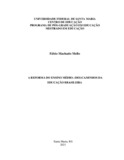| dc.creator | Mello, Fábio Machado | |
| dc.date.accessioned | 2021-11-25T11:42:00Z | |
| dc.date.available | 2021-11-25T11:42:00Z | |
| dc.date.issued | 2021-07-29 | |
| dc.identifier.uri | http://repositorio.ufsm.br/handle/1/22975 | |
| dc.description.abstract | This study had as object of investigation the “new” high school reform, examining the development context context of the proposal as well as its political-pedagogical content. Methodologically we the fundamentals of the qualitative approach, also doing a literature research from which the texts of the secondary education reform were analyzed, the law nº 13.415/2017, Brazilian National Common Curricular Base (BNCC/2018) and National Curricular Guidelines for Secondary Education (DCNEM/2018) of the reform, and it was analyzed the orientations and political and educational conceptions of International Monetary Fund (IMF), World Bank (WB) and United Nations Educational, Scientific and Cultural Organization (UNESCO). The paper had the purpose of investigating the context, influences, individuals and institutions involved, in the process of development and approval of the reform and comprehend the political and education meanings (implicit and explicit) materialized in high school reform. The specific objectives were based on: analyze the main changes promoted by the Law n. 13.415/2017 and DCNEM/2018; discuss the curriculum proposal and the political-pedagogical foundations of the BNCC 2018; comprehend how the reform fits into the context of the offensive of neoliberal policies; analyze to what extent this reform is articulated with business interests; exploratory analysis of the effects of curriculum reform on the work of high school teachers. The research shows evidence of capital offensive on education, this evidence is materialized in the bourgeois class influencing and co-opting the state sphere with the purpose of refounding the social imagination, the making of the working class and the pedagogical concepts that guide public education in the country. It is understood that the reform constitutes a deepening of the privatizing processes already faced in high school, as well as contributes to the precariousness of teaching, precariousness and control over the work of teachers, for the flexible and pragmatic formation of young people, transforming high school into the final stage of education for the majority of Brazilian youth. | eng |
| dc.description.sponsorship | Coordenação de Aperfeiçoamento de Pessoal de Nível Superior - CAPES | por |
| dc.language | por | por |
| dc.publisher | Universidade Federal de Santa Maria | por |
| dc.rights | Attribution-NonCommercial-NoDerivatives 4.0 International | * |
| dc.rights.uri | http://creativecommons.org/licenses/by-nc-nd/4.0/ | * |
| dc.subject | Reforma do ensino médio | por |
| dc.subject | Lei nº 13.415/2017 | por |
| dc.subject | BNCC | por |
| dc.subject | Privatização da educação | por |
| dc.subject | High school reform | eng |
| dc.subject | Law nº 13.415/2017 | eng |
| dc.subject | Privatization of education | eng |
| dc.title | A reforma do ensino médio: (des)caminhos da educação brasileira educação | por |
| dc.title.alternative | The high school reform: divergent paths of brazilian education | eng |
| dc.type | Dissertação | por |
| dc.description.resumo | Este trabalho teve como objeto de estudo a “nova” reforma do ensino médio, examinando o contexto de desenvolvimento da proposta, assim como seu conteúdo político-pedagógico. Como metodologia foram adotados os fundamentos da abordagem qualitativa, lançando mão da pesquisa bibliográfica, a partir da qual foram analisados os textos da reforma do ensino médio, a lei nº 13.415/2017, a Base Nacional Comum Curricular (BNCC/2018) e as Diretrizes Curriculares Nacionais para o Ensino Médio (DCNEM/2018) da reforma, e também a análise das orientações e concepções políticas e educacionais do Fundo Monetário Internacional (FMI), Banco Mundial (BM) e Organização das Nações Unidas para a Educação, a Ciência e a Cultura (UNESCO). O trabalho teve como orientação investigar o contexto, as influências, os sujeitos e instituições envolvidos, no processo de tramitação e aprovação da reforma e compreender os sentidos políticos e educacionais (implícitos e explícitos) materializados na reforma do ensino médio, instituída através da Lei n. 13.415/2017, da BNCC do ensino médio e das DCNEM 2018. Os objetivos específicos pautaram-se em: analisar as principais alterações promovidas pela Lei n. 13.415/2017 e pelas DCNEM/2018; debater a proposta curricular e os fundamentos político-pedagógicos presentes na BNCC/2018; compreender de que maneira a reforma se insere no contexto de ofensiva de políticas neoliberais; analisar em que medida essa reforma se articula com os interesses empresariais; analisar os possíveis efeitos da reforma curricular no trabalho dos professores do ensino médio. A pesquisa evidencia a ofensiva do capital sobre a educação, esta materializada na classe burguesa influenciando e cooptando a esfera estatal com vistas a refundar o imaginário social, a formação da classe trabalhadora e as concepções pedagógicas que balizam a educação pública no país. Compreende-se que a reforma constitui um aprofundamento dos processos privatizantes já enfrentados no ensino médio, assim como concorre para a precarização do ensino, precarização e controle sobre o trabalho dos professores, para a formação flexível e pragmática dos jovens, transformando o ensino médio em etapa final da educação para a maioria dos jovens brasileiros. | por |
| dc.contributor.advisor1 | Ivo, Andressa Aita | |
| dc.contributor.advisor1Lattes | http://lattes.cnpq.br/5435147861393098 | por |
| dc.contributor.referee1 | Ferreira, Liliana Soares | |
| dc.contributor.referee2 | Hypolito, Álvaro Luiz Moreira | |
| dc.creator.Lattes | http://lattes.cnpq.br/0039273598388146 | por |
| dc.publisher.country | Brasil | por |
| dc.publisher.department | Educação | por |
| dc.publisher.initials | UFSM | por |
| dc.publisher.program | Programa de Pós-Graduação em Educação | por |
| dc.subject.cnpq | CNPQ::CIENCIAS HUMANAS::EDUCACAO | por |
| dc.publisher.unidade | Centro de Educação | por |



